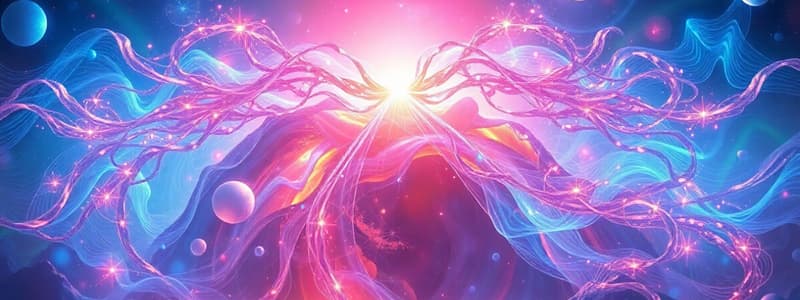Podcast
Questions and Answers
What is a phenomenon, as defined in the text?
What is a phenomenon, as defined in the text?
A phenomenon is any change or observable event that can be explained by scientific laws.
What are the two main types of phenomena discussed in the text?
What are the two main types of phenomena discussed in the text?
- Physical and chemical phenomena (correct)
- Biological and geological phenomena
- Natural and artificial phenomena
- Simple and complex phenomena
Which of the following is NOT an example of a physical phenomenon?
Which of the following is NOT an example of a physical phenomenon?
- Folding or tearing a sheet of paper
- Breaking a stick of chalk
- Burning wood (correct)
- Dissolving salt in water
What are the two main characteristics of physical phenomena, as described in the text?
What are the two main characteristics of physical phenomena, as described in the text?
Physical phenomena are always irreversible.
Physical phenomena are always irreversible.
What is the main characteristic of chemical phenomena?
What is the main characteristic of chemical phenomena?
A chemical phenomenon always involves a chemical reaction.
A chemical phenomenon always involves a chemical reaction.
Flashcards
Phenomenon
Phenomenon
An observable event that alters the properties of matter.
Physical Phenomena
Physical Phenomena
Changes that do not alter a substance's inherent nature.
Chemical Phenomena
Chemical Phenomena
Changes that involve a chemical reaction, altering the substance's nature.
Reversibility
Reversibility
Signup and view all the flashcards
Universality
Universality
Signup and view all the flashcards
Dissolving
Dissolving
Signup and view all the flashcards
Breaking
Breaking
Signup and view all the flashcards
Folding
Folding
Signup and view all the flashcards
Tearing
Tearing
Signup and view all the flashcards
Ice cubes in glass
Ice cubes in glass
Signup and view all the flashcards
Control experiment
Control experiment
Signup and view all the flashcards
Chemical reaction
Chemical reaction
Signup and view all the flashcards
Saltwater
Saltwater
Signup and view all the flashcards
Chalk stick
Chalk stick
Signup and view all the flashcards
Paper properties
Paper properties
Signup and view all the flashcards
Observation
Observation
Signup and view all the flashcards
Matter dynamics
Matter dynamics
Signup and view all the flashcards
Alter properties
Alter properties
Signup and view all the flashcards
Inherent nature
Inherent nature
Signup and view all the flashcards
Observable event
Observable event
Signup and view all the flashcards
Properties of matter
Properties of matter
Signup and view all the flashcards
Study Notes
Phenomena
- Matter is dynamic, not static, undergoing transformations called phenomena.
- Phenomena are observable events that can be explained by laws.
- Two types of phenomena exist: physical and chemical.
Physical Phenomena
- Do not change the inner nature of a substance.
- Examples include:
- Dissolving salt or sugar in water
- Breaking a chalk stick
- Folding or tearing paper
- Characteristics of physical phenomena:
- Universality: affects all substances.
- Reversibility: stops when the cause is removed.
Chemical Phenomena
- Significantly alter the inner nature of a substance.
- Involve chemical reactions.
Studying That Suits You
Use AI to generate personalized quizzes and flashcards to suit your learning preferences.




